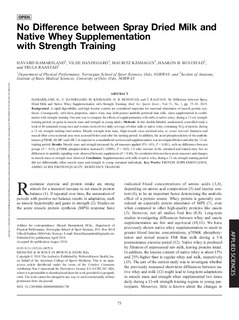| dc.contributor.author | Hamarsland, Håvard | |
| dc.contributor.author | Handegard, Vilde | |
| dc.contributor.author | Kåshagen, Mauritz | |
| dc.contributor.author | Benestad, Haakon Breien | |
| dc.contributor.author | Raastad, Truls | |
| dc.date.accessioned | 2019-01-07T11:53:31Z | |
| dc.date.available | 2019-01-07T11:53:31Z | |
| dc.date.created | 2018-10-22T14:53:44Z | |
| dc.date.issued | 2018 | |
| dc.identifier.citation | Medicine & Science in Sports & Exercise. 2018, 51, 75-83. | nb_NO |
| dc.identifier.issn | 0195-9131 | |
| dc.identifier.uri | http://hdl.handle.net/11250/2579464 | |
| dc.description.abstract | Background: A rapid digestibility and high leucine content are considered important for maximal stimulation of muscle protein synthesis. Consequently, with these properties, native whey may hold greater anabolic potential than milk, when supplemented in combination with strength training. Our aim was to compare the effects of supplementation with milk or native whey, during a 12-week strength training period, on gains in muscle mass and strength in young adults. Methods: In this double-blinded, randomized, controlled study a total of 40 untrained young men and women received two daily servings of either milk or native whey containing 20 g of protein, during a 12-week strength training intervention. Muscle strength, lean mass, thigh muscle cross sectional area, m. vastus lateralis thickness and muscle fiber cross sectional area were assessed before and after the training period. In addition, the acute phosphorylation of the anabolic kinases p70S6K, 4E-BP1 and eEF-2 in response to a standardized workout and supplementation was investigated before and after the 12-week training period. Results: Muscle mass and strength increased, by all measures applied (5-16%, P < 0.001), with no differences between groups (P > 0.25). p70S6K phosphorylation increased (~1000%, P < 0.02) 2 hours after exercise in the untrained and trained state, but no differences in anabolic signaling were observed between supplements (P > 0.40). No correlation between these acute measures and changes in muscle mass or strength were observed. Conclusion: Supplementation with milk or native whey during a 12-week strength training period did not differentially affect muscle mass and strength in young untrained individuals. | nb_NO |
| dc.language.iso | eng | nb_NO |
| dc.subject | protein supplementation | nb_NO |
| dc.subject | amino acids | nb_NO |
| dc.subject | protein quality | nb_NO |
| dc.subject | resistance training | nb_NO |
| dc.title | No Difference Between Spray Dried Milk and Native Whey Supplementation with Strength Training | nb_NO |
| dc.type | Journal article | nb_NO |
| dc.type | Peer reviewed | nb_NO |
| dc.description.version | publishedVersion | nb_NO |
| dc.rights.holder | 2018 The Author(s). Published by Wolters Kluwer Health, Inc. on behalf of the American College of Sports Medicine. This is an openaccess article distributed under the terms of the Creative Commons Attribution-Non Commercial-No Derivatives License 4.0 (CCBY-NC-ND), where it is permissible to download and share the work provided it is properly cited. The work cannot be changed in any way or used commercially without permission from the journal. | nb_NO |
| dc.source.journal | Medicine & Science in Sports & Exercise | nb_NO |
| dc.identifier.doi | 10.1249/MSS.0000000000001758 | |
| dc.identifier.cristin | 1622320 | |
| dc.description.localcode | Seksjon for fysisk prestasjonsevne / Department of Physical Performance | nb_NO |
| cristin.unitcode | 150,31,0,0 | |
| cristin.unitname | Seksjon for fysisk prestasjonsevne | |
| cristin.ispublished | true | |
| cristin.fulltext | original | |
| cristin.qualitycode | 2 | |
